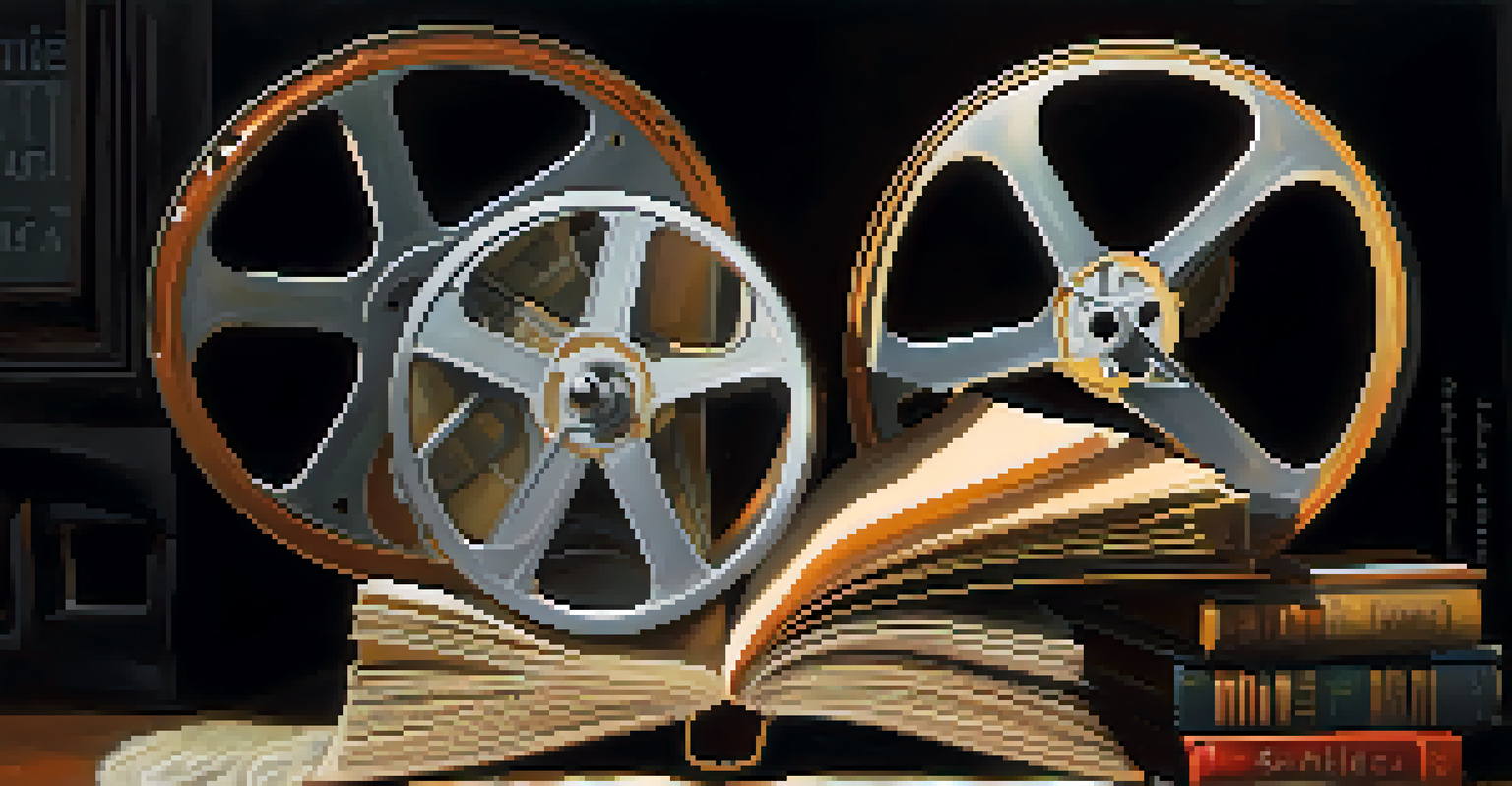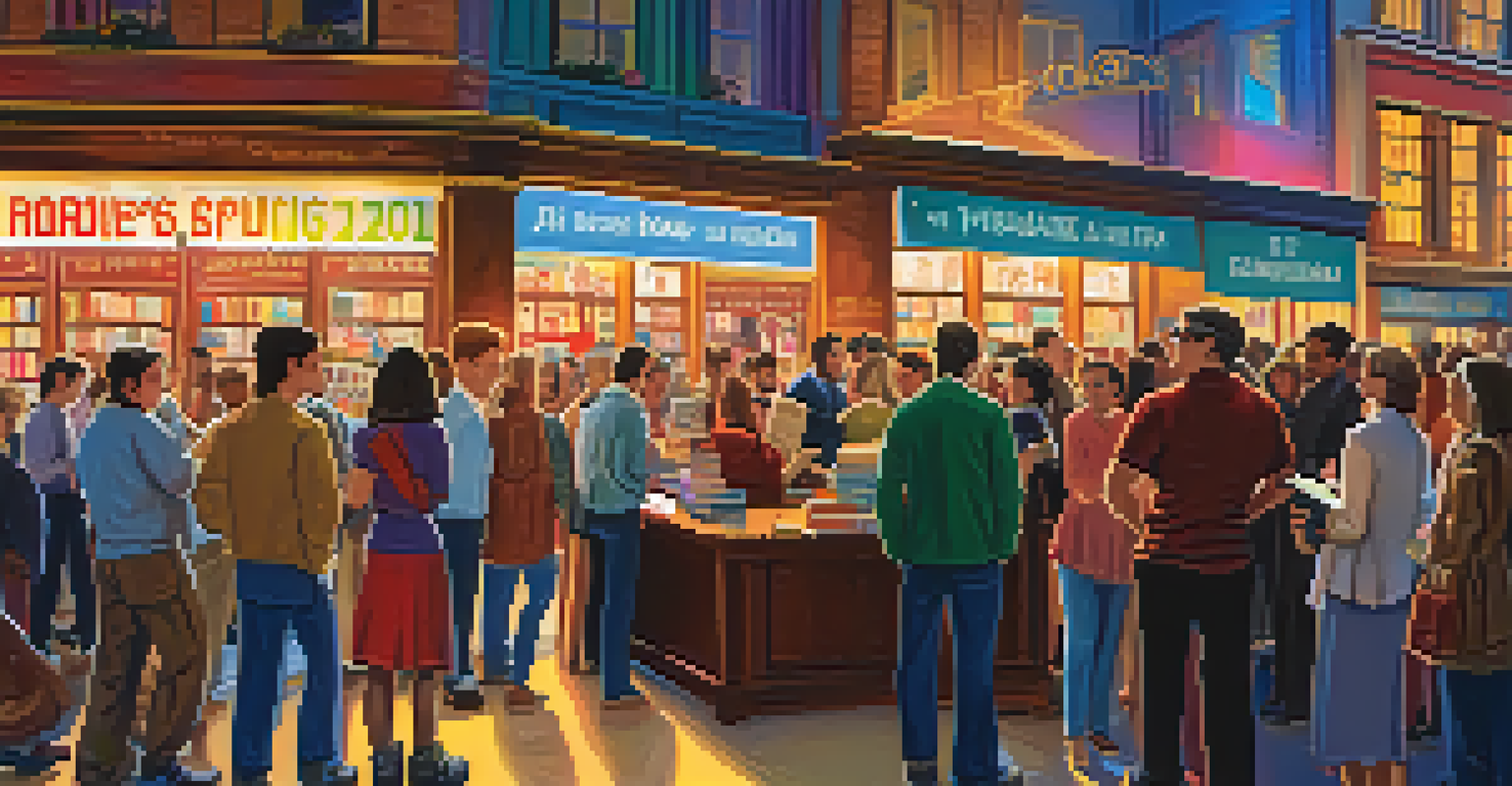Impact of Box Office Hits on Literary Sales and Relevance

How Box Office Success Drives Book Sales
When a film becomes a box office hit, it often leads to a surge in book sales. For instance, adaptations of popular novels like 'The Hunger Games' series saw significant increases in sales following the film releases. This phenomenon occurs because fans of the movie often want to explore the source material, leading to a win-win situation for both the film industry and authors.
Books are a uniquely portable magic.
Moreover, books that are turned into movies gain visibility that they might not have had otherwise. The marketing campaigns surrounding these films often highlight the original literary work, piquing the interest of potential readers who may not have encountered the book before. This increased exposure can result in a new readership that sustains sales long after the film has left theaters.
Additionally, the excitement and buzz generated by box office hits can lead to renewed interest in related works. For example, a successful fantasy film might encourage readers to explore other books in the genre, increasing sales for both the original title and other similar works.
The Role of Adaptations in Literary Relevance
Film adaptations can play a crucial role in keeping a book relevant in contemporary culture. When a classic novel is adapted into a movie, it often brings the story to a new generation of readers who might not have encountered it otherwise. For instance, adaptations of Jane Austen's works continue to engage audiences, ensuring that her literature remains part of the cultural conversation.

Not only do adaptations spark interest in the original texts, but they also provide opportunities for discussions about themes, characters, and historical contexts. This dialogue can reinvigorate interest in literature and encourage people to read the books to deepen their understanding of the stories. In essence, adaptations act as gateways for readers to explore literary classics.
Films Boost Book Sales Significantly
Box office hits often lead to increased book sales as fans seek out the original material after enjoying the film.
Moreover, successful adaptations can lead to the resurgence of entire literary movements or genres. For example, the popularity of the 'Harry Potter' films propelled a wave of interest in young adult fantasy literature, leading to a boom in both sales and the publication of new titles in this genre.
The Influence of Marketing and Promotion
The marketing strategies used for box office hits significantly impact the literary market. Often, publishers collaborate with film studios to create promotional materials that link the book to the film's release. This partnership can lead to special editions, with cover art featuring the movie's stars, enticing fans to purchase the book.
The man who does not read has no advantage over the man who cannot read.
Social media also plays a pivotal role in this relationship. As trailers and teasers drop, literary discussions often flood platforms like Twitter and Instagram, creating community buzz. Readers share their thoughts, predictions, and excitement, which can translate into increased sales as followers become eager to read the book before seeing the movie.
Furthermore, events like book signings, author panels, and film screenings can create a sense of urgency around the literary work. When fans see their favorite actors promoting the book, it adds an element of excitement that can drive immediate sales, demonstrating the symbiotic relationship between movies and literature.
The Impact of Genre on Sales Trends
The genre of a book plays a significant role in its sales performance following a film adaptation. For example, the romance genre often sees a spike in sales for books that have been turned into romantic comedies. Films like 'The Fault in Our Stars' not only boost the sales of the original novel but also lead to increased interest in similar titles in the genre.
On the other hand, genre-specific adaptations, such as horror or thriller films, can create a unique trend in the literary market. Successful horror movies often lead to a rise in sales for not just the original book but also other works by the same author or in the same genre. This trend highlights how specific genres can capitalize on the momentum created by box office hits.
Adaptations Keep Literature Relevant
Film adaptations introduce classic novels to new generations, sparking interest and discussions that rejuvenate literary engagement.
Additionally, genres that are less frequently adapted might not see as dramatic an impact on sales. However, niche audiences often rally around the material, creating a dedicated following that can sustain sales over a longer period, illustrating that while box office hits can boost sales, the underlying interest in the genre also plays a critical role.
Cultural Reflections in Adaptations and Sales
Box office hits often reflect cultural trends and societal values, which can influence literary sales. For instance, films that tackle contemporary issues such as mental health or social justice can lead to increased interest in books addressing those same topics. This connection illustrates how adaptations can serve as a mirror to society, driving readers to seek out literature that resonates with their experiences.
Moreover, adaptations can prompt discussions around representation in literature. When a film features diverse characters or narratives, it encourages audiences to seek out the original books, especially if they want to learn more about underrepresented voices. This can lead to a broader appreciation for literature that reflects varied perspectives and experiences.
Ultimately, the cultural relevance of both films and books can create a cycle where adaptations rejuvenate interest in important literary works, fostering a deeper understanding of societal issues. This ongoing dialogue between cinema and literature enriches the cultural landscape and invites readers to engage with diverse narratives.
The Long-Term Effects of Box Office Hits
While the immediate impact of a box office hit on literary sales is often notable, the long-term effects can be just as significant. Successful adaptations can lead to lasting changes in how books are perceived and marketed. For instance, a film that reignites interest in a classic novel can result in a steady stream of sales for years to come as new readers discover the text.
Additionally, the success of adaptations can encourage publishers to take risks on lesser-known authors or titles. When a particular genre experiences a surge in popularity due to a successful film, publishers may seek new voices to fill that niche, leading to a more diverse literary landscape. This can ultimately benefit readers who are looking for fresh perspectives.
Marketing Drives Literary Success
Collaborative marketing between publishers and film studios enhances visibility for books, leading to increased sales and readership.
Furthermore, the relationship between film and literature continues to evolve, with new technologies and platforms emerging. Streaming services, for example, have created opportunities for adaptations that might not have made it to the big screen, allowing more literary works to reach audiences. This expansion keeps literature relevant and accessible, ensuring its continued influence in popular culture.
Conclusion: A Symbiotic Relationship
The impact of box office hits on literary sales and relevance highlights a fascinating interplay between two forms of storytelling. As films bring books into the spotlight, they create opportunities for readers to discover new stories and revisit old favorites. This symbiotic relationship strengthens both industries, proving that great stories can transcend mediums.
Moreover, the ongoing collaboration between filmmakers and authors fosters a culture where literature remains vibrant and dynamic. By adapting diverse narratives, the film industry not only honors the original works but also introduces them to wider audiences, ensuring their legacy lives on. This cycle of adaptation and discovery can breathe new life into literary works that might otherwise fade into obscurity.

Ultimately, the connection between box office success and literary sales is a testament to the enduring power of storytelling. Whether through the written word or the silver screen, stories continue to captivate and inspire, bridging the gap between different forms of expression and enriching our lives in the process.